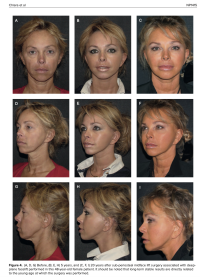I have finished reversing accelerated aging from menopause 2.4 years ago. I don't plan on any more plastic surgery until my 70s. I just didn't want to look 50s. Looking 20s happened by accident as I reversed the changes menopause created to my face and body. For instance getting rid of nlfs will make anyone look 20s.
I am now focusing on longevity. Sadly 7 million people died of covid but I already worked out prophylaxis and early meds to prevent and treat so my OH and I are novids (never tested pos for covid). I have my working theories on how to prevent and treat cancer too. And am working on improving my memory with daily blueberries and vitamin E. There is a lot to keep me busy as my next project and challenge include how to tackle the pfizer covid mrna gene therapy jab side effects many of us took unwittingly and its risk of turbo cancer. But all this is reserved for my private social media account as this is a plastic surgery forum. And hopefully I have warned the public here on the permanent risks of deep plane facelifts.
According to this physical therapist's balance test I am also under 30s physically. Cross your arms, stand on one leg and close your eyes for at least 30 seconds.
View attachment 6010657
I saw several articles in the last 10 days about this. I have been hesitant to take Fish Oil caps since, trying to eat more salmon instead
WEDNESDAY, May 22, 2024 (HealthDay News) -- Folks regularly taking
fish oil supplements might not be helping their health as much as they might think, a new study suggests.
Regular use of fish oil supplements could increase the risk of first-time heart disease and stroke among those with good heart health, new research suggests.
However, the long-term study also found that fish oil can help those whose hearts are already in trouble, potentially slowing the progression of heart problems and lowering the risk of death.
Healthy people taking fish oil supplements had a 13% increased risk of developing atrial fibrillation, a heart rhythm problem that increases the risk of heart attack and stroke, researchers found.
They also had a 5% increased risk of stroke, results show.
“Our findings suggest caution in the use of fish oil supplements for primary prevention because of the uncertain cardiovascular benefits and adverse effects,” wrote the research team led by
Dr. Hualiang Lin, an epidemiologist with Sun Yat-Sen University in Guangzhou, China.
But in those with existing heart disease, regular use of fish oil lowered risk of a heart attack due to atrial fibrillation by 15%, and the risk of heart failure leading to death by 9%.
“Regular use of fish oil supplements might have different roles in the progression of cardiovascular disease,” based on whether someone already has heart problems, the researchers suggested.
“Overall, I would say that the days where people just go to the store and buy buckets of fish oil pills to keep them well should be over, but fish oil may still have a role in people who are already sick,"
Dr. Andrew Freeman, director of cardiovascular prevention and wellness at National Jewish Health in Denver, told
CNN.
When it comes to fish oil, “the devil is in the details,” neurologist
Dr. Richard Isaacson, director of research at the Institute for Neurodegenerative Diseases in Boca Raton, Fla., told
CNN.
“First, we recommend testing for omega-3 fatty acid levels -- there are finger-prick tests you can buy online which are accurate -- and then you should continue to test. You don’t want to take fish oil if you don’t need it,” he stressed.
Isaacson recommended getting omega-3 fatty acids from food and added that sardines and wild-caught salmon are the best sources. Farm-raised salmon is not the best choice, he said, because of impurities in the water in which they are raised.
Fish oil remains a rich source of omega 3 fatty acids, which are thought to help both heart and brain health. As such, health experts recommend that people eat oily fish like salmon at least once a week or use fish oil supplements, researchers said in background notes.
For the study, the team analyzed data from nearly 416,000 people ages 40 to 69 participating in a large-scale health study in the United Kingdom. These people were surveyed between 2006 and 2010 to gather basic health information, including their regular diet and supplement use.
https://www.usnews.com/news/health-...a,a 5% increased risk of stroke, results show.
 I've learned a lot from your thread about facelifts!
I've learned a lot from your thread about facelifts!

